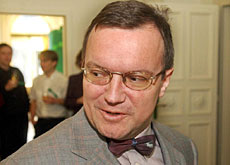Consensus politics risks becoming big loser

After its strong showing in October’s elections, the rightwing Swiss People’s Party has thrown down the gauntlet to parliament in December’s cabinet vote.
The party is challenging the composition of Switzerland’s power-sharing government with its demands for a second seat in the cabinet.
Political analysts say an additional seat for the People’s Party would alter the character of the government, both by moving it further to the Right and by undermining the consensus nature of Swiss politics.
“It would mean a general shift to the Right in many more policy areas,” political analyst, Emanuel von Erlach, told swissinfo.
“That would also put the [centre-left] Social Democrats in a real minority position.”
Erlach’s views are shared by Clive Church, an expert on Swiss politics at the University of Kent in Britain.
He says the structure of the cabinet is significant in determining policy decisions, and under its current composition it usually manages to agree on the broad lines of policy.
Ballot box
Decisions can be, and often are, modified by parliament, and Switzerland’s system of direct democracy leaves the last word to the electorate, which can challenge any decision at the ballot box.
The demands for a second seat, says Church, are a clear indication that the People’s Party is trying to change Switzerland’s political system away from consensus politics, where all seven ministers agree to tow a collective line on issues.
“They want it to become more ideological and more majoritarian,” he said.
“Those of us who live under a majoritarian system are much more aware of its defects, where many people will never have a government of their choice,” he added.
In Church’s view, October’s parliamentary elections opened the door for a debate on the make-up of the government, but the results themselves are not enough to force a government reshuffle.
Demand
Church insists very little would have changed if the People’s Party had not immediately demanded an additional seat in government – at the expense of the Christian Democrats.
“Had they taken a less proactive role and waited to see what parliament made of the results, the situation would be very different,” he told swissinfo.
“It’s the party’s aggressive use of the results that has made the difference to what might have been a more gradual transition.”
Since 1959, an informal power-sharing arrangement, known as the “Magic Formula”, has shared out cabinet seats among Switzerland’s four main political parties according to their electoral strength at the time.
The centre-right Christian Democrats and Radicals both have two seats as does the centre-left Social Democrats.
Popularity
The People’s Party has only one, but its popularity at the ballot boxes in recent elections – it secured the largest single share of the vote in October – has led to demands that it be granted a second cabinet seat.
It has also threatened to withdraw from the government completely unless its official candidate – the party’s controversial driving force, Christoph Blocher – is elected.
October’s results have created divisions among and within the parties in the run-up to the cabinet election on December 10.
To the dismay of some Christian Democrats, both their ministers – Ruth Metzler and Joseph Deiss – have refused to stand down.
Suggestions that the Radicals, who also performed poorly in the elections, should hand over one of their seats – made vacant by the resignation of Kaspar Villiger – have met with a mixed response both within and outside of the party.
Pot shots
The Social Democrats spent much of the summer taking pot shots at the Christian Democrats, but are perhaps the least enthusiastic about the People’s Party being given a second seat.
And the People’s Party has threatened to demand the resignation of its sole minister, Samuel Schmid, unless Blocher is elected alongside him.
Church says October’s results have revealed internal divisions and public disagreements.
Unless those divisions are healed, he says, the cabinet election could be chaotic.
“Everything that has happened so far seems to suggest that the parties have forgotten about the need to look at alternatives, and each of them seems to be going its own sweet way,” he said.
“They are not reacting to the challenge that has been thrown down, and that is going to get them into difficulties unless they reach an agreement.”
swissinfo, Jonathan Summerton
Every four years, shortly after parliamentary elections, cabinet ministers wishing to remain in office need to have their mandate renewed by parliament.
In October’s elections the People’s Party received 26.6% of the vote, the Social Democrats 23.3%, the Radicals 17.3% and the Christian Democrats 14.4%.
Immediately after the election the People’s Party demanded a second seat in the cabinet for Christoph Blocher.
When the Magic Formula was introduced in 1959, it awarded seats on the relative strength of the four main political parties at the time.

In compliance with the JTI standards
More: SWI swissinfo.ch certified by the Journalism Trust Initiative










You can find an overview of ongoing debates with our journalists here . Please join us!
If you want to start a conversation about a topic raised in this article or want to report factual errors, email us at english@swissinfo.ch.